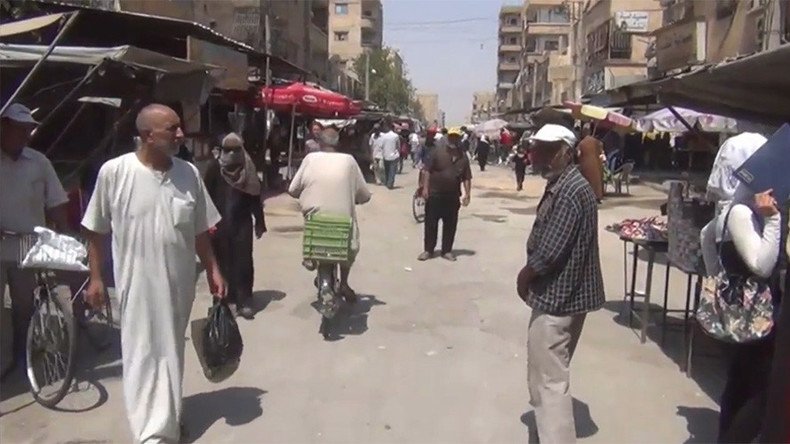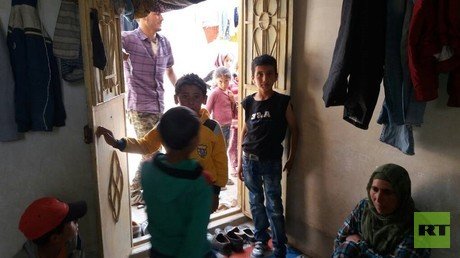RT inside ISIS-besieged Deir ez-Zor: Daily struggle for food, soaring prices, glimpses of hope

Hopes of returning to normal existence lie with the Syrian army, residents of the ISIS-besieged city of Deir ez-Zor told RT in exclusive footage recorded just a stone’s throw from the frontline, where armed forces are making a final push to liberate the city.
Syrians in the city of Deir ez-Zor have somehow managed to maintain their sanity amid the terror and severe shortages of food, medicine and basic commodities. Markets, the heart of a typical Middle Eastern society, function as they did for hundreds of years, with one notable exception – a lack of products to sell and those in supply are sold at astronomical prices.
Islamic State (IS, formerly ISIS/ISIL) terrorists who encircled the city in the summer of 2014 had effectively blocked all commercial and humanitarian access into Deir ez-Zor, trapping hundreds of thousands of civilians with little or no means to survive.
An estimated 125,000 civilians are still reportedly trapped in the city, living under appalling conditions.
Airdropped aid by the UN, Russian and Syrian governments is the only lifeline that supports Deir ez-Zor. In a city where water and basic food necessities are impossible to come by, scavenging for food and firewood has become a full-time job.
For those unfortunate enough to miss the dropped aid, the market place serves as the last hope from malnutrition, starvation and ultimately death.
Under such conditions, the black market economy has flourished. Markets stalls in the besieged neighborhood of Al-Jura offer customers basic food products, cigarettes, oil, and soap but at significantly higher prices.
Locals who spoke to RT are counting the days until the army breaks the blockade of the city so that life – and market prices – could return to normal.
“May God make them victorious, and may Him make ISIS humiliated. May God make us free of (ISIS) by the will of our army. I salute our army and president,” said one resident.
“We wouldn't have sat here without the Syrian Arab Army, we are sleeping while the army is protecting us,” another civilian added.
People at the market noted a direct correlation between the army’s advance and the food prices in the city. The closer the army gets to lifting the siege, the cheaper the prices get.
“The prices are better than before, but they are expensive. We hope that God would lift the siege by the will of our army,” one of the residents said.
“The prices are going down, the more our army is moving towards Deir ez-Zor, hopefully, the more the prices are going down,” another local explained,
“Onions cost 3,000 (Syrian pounds, around 6 USD), Mulukhiyah cost 2,000 (Syrian pounds), we did not eat any of them, we had no money to buy them, the bread you can get was uneatable, it is even the bread,” Deir ez-Zor resident shared with RT.
READ MORE: 'The routes in Syria are now open toward liberating Deir-ez-Zor'
The Syrian Arab Army has achieved a number of important victories in the Deir ez-Zor governorate over the last month. Despite this, IS continues to send reinforcements to Deir ez-Zor, as jihadists are being slowly but surely driven out of other governorates of Syria.
Russian military police to control 3rd de-escalation zone coming into force in Syria’s Homs – MoD https://t.co/oW7bWYQe7a
— RT (@RT_com) 3 August 2017
Just this week, IS embarked on a drive to enlist locals of the city to join their ranks. According to Asharq al-Awsat, an Arabic international newspaper headquartered in London, terrorists declared that “all young men aged 20 to 30 years old must enlist to fight throughout Syria.” But as the government forces near the city, residents of Deir ez-Zor are disregarding ISIS' order to enlist.
READ MORE: Russian airstrikes kill 2 ISIS commanders, thwart major attack on Deir ez-Zor – military
Despite IS' resolve to put up a last stand for the control of the city, Russian and Syrian air strikes on terrorist targets allied to the Syrian government's ground offensive inches the besieged city closer to liberation.
On Wednesday, the battle to rid the jihadists played out “on the axis of al-Hweiqeh, al-Rishdieh, and the surroundings of the Airport,” Syria's SANA news agency reported.
ISIS fighters reportedly trying to sell enslaved Yazidi women before attempting to flee Syria – UN pic.twitter.com/8qfBEJPkdl
— RT (@RT_com) 3 August 2017
The Syrian Air Force has meanwhile targeted IS terrorists in the areas of “al-Panorma and al-Mawared; the neighborhoods of al-Rishdieh, al-Hweiqeh, Khasarat; and the villages of al-Hussenieh, al-Bougheilieh, Hatleh, Hweijet Saker, Aiyash, and al-Masrab.”
“The airstrikes resulted in destroying several ISIS sites and killing many of them, including Kuwaiti terrorists Aweid al-Barak and Aeid al-Dakheil, Saudi terrorist 'Abu Aisha al-Jazrawi,' and Malaysian terrorist 'Abu Mariam',” a SANA reporter noted from the frontline.
The report also said that many terrorists including commanders are fleeing the province, including jihadist leaders “Gliebib the Tunisian” and “Abu Talha the Belgian.”
The Russian defense minister, Sergey Shoigu, said at the weekend that the fall of IS in Deir ez-Zor might signal the end of the jihadist organization.
“Today there are key points, including Deir ez-Zor. I would say, first of all, Deir ez-Zor. There have been military actions for more than one year. People bravely fight there. Regularly, two or three, or it happens, four times a week, food, medicine, ammunition are being delivered there,” Shoigu said. “This is perhaps the main point at the Euphrates, which will in many ways indicate the end of the fight against ISIS.”













